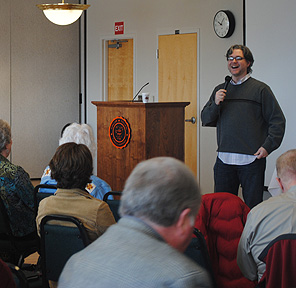
Rev. Landon Whitsitt discusses the role of the pastor during the third session of the Theologian-in-Residence lecture series Tuesday.
Wise group decision-making in churches and the role of pastor were discussed Tuesday during the third session of the annual Theologian-in-Residence lecture series at Tusculum College.
The Rev. Landon Whitsitt, author of “Open Source Church: Making Room for the Wisdom of All,” is leading the annual Theologian-in-Residence series, co-sponsored by the Holston Presbytery and Tusculum College with funding from Ron Smith. Whitsitt is the stated clerk of the Synod of Mid-America in the Presbyterian Church (U.S.A.).
While writing his book, Whitsitt said he was in intense discussions about the role of pastor with the church he was serving at the time. The church members wanted a traditional pastor, “a local church expert,” he continued.
The church had a great congregation, but it was facing some challenges as the community dynamic was changing and its membership was not growing as surrounding churches were. In his interview for the pastorate, Whitsitt said he was asked, “‘Pastor, what is your church growth plan?’ I knew they were going to ask that question, and I don’t blame them for that. The problem I had with the question was the word ‘your.’”
In today’s society, church members often expect the pastor to be an expert in everything related to the church, which is not the best approach, he said, referring to the book “The Wisdom of Crowds: Why the Many Are Smarter Than the Few and How Collective Wisdom Shapes Business, Economies, Societies and Nations” by James Surowiecki, which focuses on the premise that trusting experts is a costly mistake.
People often confuse ‘expert’ with ‘expertise’ and do not know how to define expert, he said. “If we are in such dire straits that we need an expert to save us, how are we going to know when that expert walks through the door?”
It is not that pastors do not want to meet all these expectations, he said, because they desire to live up to the trust that their congregations have placed in them. However, people are usually skilled in a specific area, and others in the church may be better skilled in some of the roles, such as administration, which churches now look to the pastor to fill.
What is needed is not an expert, but church members themselves, Whitsitt said. With one person, there is a limited world view. “Instead of one expert running the whole show, I would suggest that we trust the wisdom of the group,” he continued.
But, there are some pitfalls to be avoided in constituting that group, Whitsitt pointed out. Some people would agree with placing a group in a decision-making role and then try to compose that group of experts in the specific area being addressed. In this approach, the group is often composed of people that have expertise and people who already know the rules of the church, which reinforces a closed church.
“What we need to do is gather a group of normal people and give them the authority to make decisions.”
To avoid group think, a decision-making body should be composed of people with different life experiences and points of views, Whitsitt said. “When diversity is a value, it gives us permission to be independent in our thinking,” he continued.
Rev. Whitsitt also addressed what he described as the “go along to get along” Christian faith, in which people decide to be nice and not voice their opinions when they may disagree.
“I don’t think this is what Jesus wants for us,” he said. “Jesus wants us to kind, patient, gentle and have self control, the fruits of the spirit. Jesus wants us to have some independence of thought. What the Christian faith is calling for and what the church needs is for us to not check our brains at the door and to discuss what is significant thoughtfully.”
One way to ensure that a group makes wise decisions is to make sure that the questions that the group must consider are important, which helps members maintain independent thought, he said.
Another way to ensure independent thought is to allow individuals to offer private information they have, which may be facts, beliefs, thoughts or ideas. For a big decision, he recommended a two or three meeting process to give time for the issue to be carefully considered. The first meeting would involve presenting the issue and all related information without any discussion. The second meeting would be for discussion and a third one to vote about the issue. During discussion, he said, each person should be given the opportunity to participate equally.
The role of leaders in such groups, Whitsitt said, involves sharing information or other resources needed to make the decision and also providing space for others to participate and offer their information.
In choosing people for positions on decision-making committees, he continued, individuals selected should be those who model their lives after Jesus and have demonstrated they are willing to sacrifice for other people. He noted that changes to a more decentralized structure within a church is an incremental process that should be completed in small steps.
The Theologian-in-Residence series will conclude next Tuesday, Feb. 28. The session will begin at 10 a.m. in the Chalmers Conference Center in the Niswonger Commons on the Tusculum campus. There is no charge to attend the lecture series, but reservations are required as lunch is provided in the college’s cafeteria. To register or for more information, please call 423.636.7304 or email eestes@tusculum.edu.


